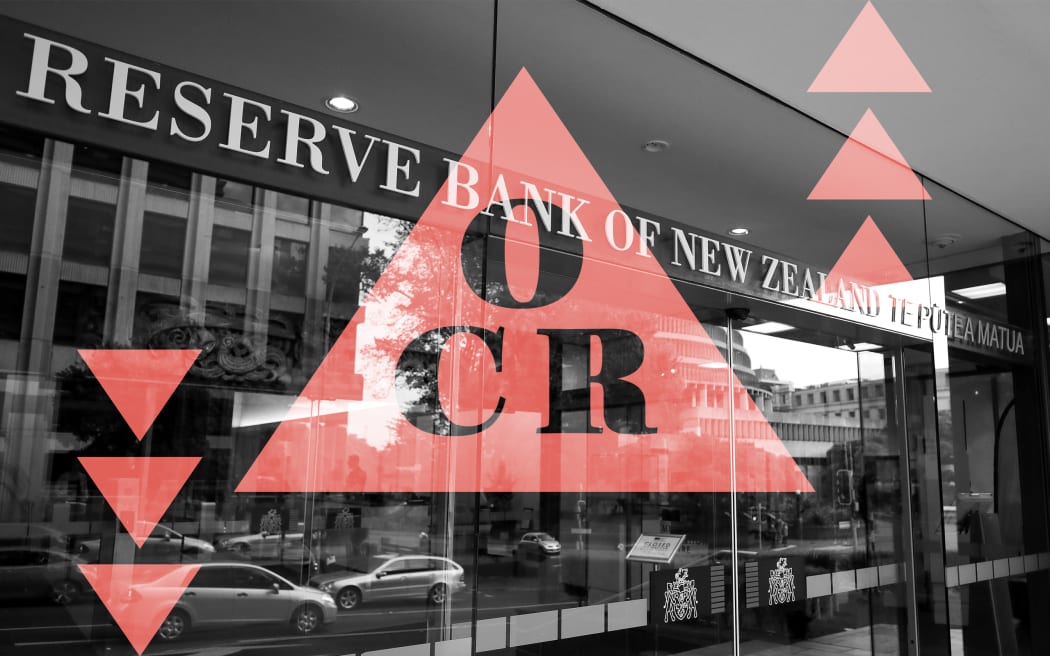Photo: RNZ
The Reserve Bank on Wednesday said it was keeping the official cash rate (OCR) at 5.5 percent.
The OCR affects the price of borrowing for lenders, directly influencing how much they charge for things like mortgages. When it goes up, so do mortgages usually – and vice versa.
Raising it lowers discretionary spending, cooling the economy and reducing inflation pressures. Lowering it makes it cheaper to borrow, promoting spending at the risk of fuelling inflation.
So why is the Reserve Bank keeping the OCR at its highest level since the global financial crisis of 2007/8? And when can we expect it – and mortgage interest rates – to drop?
Economist Bernard Hickey answered these questions and more on Wednesday’s edition of The Panel.
Q: Is New Zealand unusually obsessed with interest rates?
A: Yeah. I believe the economy we have in New Zealand is more of a housing market with bits tacked on than a real economy, because for most New Zealand families and anyone who aspires to build a life here, they need to own a home, and to do that these days you need a mortgage if you’ve bought it recently…
They’ve learned to do this because of the way that our tax system works. And so that’s why so many people are focusing all their energies on owning residential land in their own home and buying more.
Q: The Reserve Bank’s mandate has been changed back to only focusing on inflation, removing its need to consider employment rates. Why, and what effect will this have on its future OCR decisions?
A: Remember, [employment] was always ranked below inflation in the Reserve Bank’s thinking – that was performative. I didn’t think it made any difference at all because the Reserve Bank, when they think about monetary policy, are always thinking how much spare capacity is there in the economy? If we think it’s at full capacity, ie unemployment is right as low as it can possibly go, then we put up interest rates to ensure that we keep the economy under control.
And I don’t think in recent years that having the employment mandate made any difference to the interest rates the Reserve Bank applied, and removing it has made no difference either. I think it was purely performative.
Q: Do current interest rates have more or less impact on homeowners than the 17-plus percent interest rates that were about in the late 1980s?
A: Well, it’s interesting. When you look back to the late 1980s, yes, if you had a large mortgage then and it went up to, you know, 18, 19 percent – and I’ve spoken to people who were paying in some cases more than 20 percent, for those people who had what’s called second mortgages – then it was very painful. But when you look across the broad spectrum of homeowners in New Zealand now, they are more indebted, much more indebted than they were back in the late 1980s. And as a share of their disposable income, the cost of mortgages is higher now than it was then, certainly for a long period of time. However, it was never as high as it was in 2007/8 when we had mortgage rates of over 10 percent.
Bernard Hickey.
Photo:
And it’s interesting, when you look at the weight of household debt, it hasn’t actually risen relative to incomes since around about 2011/12 when the Reserve Bank started to try to reduce some of the leverage with the loan to value ratio (LVR) controls. The burden of servicing the mortgage is now actually relatively easier than it was in 2007/8 and that’s because of interest rates still being lower than they were in 2007/8, and because the burden of household debt is still higher now than it was in the late 1980s, but luckily because of the LVRs, it hasn’t kept rising. And that’s important because if there had been no LVRs, house prices would be more than double what they are now. And the amount of household debt really would be a problem.
To give you an idea of how little stress there is out there relative to what we saw in 2008/9, the number of mortgagee sales is still less than single digits per month, whereas there were hundreds per month in 2008/9. So even though there’s a lot of people in a lot of stress and they’re certainly cutting back, to be in such stress that you have to sell your house, we’re nowhere near those levels that we saw in 2007.
Q: Was the Reserve Bank’s decision to keep the OCR at 5.5 percent related to the slowdown in some areas of the economy? And was the shock decision to shut Newshub, with the loss of around 200 jobs, related to this slowdown?
A: There’s a couple of things going on there. Yes, advertising revenues for television have been low lately because of the cyclical slowdown in the economy. But there’s also some structural things going on there with a lot of advertisers moving online or just not advertising at all anymore. And so, the stress was on.
Certainly these job losses are partly a result of the slowdown in the economy and the expectations of the owners, the foreign owners, that bounce-back that they thought was going to happen this year hasn’t happened. But there are other issues there I think around the structure of the advertising market and particularly the way that online advertising, the likes of Google and Facebook have hoovered up that money, and it’s not going to the people who are producing news – it’s going to the social media and search networks.
Q: When will inflation drop to 1-3 percent, the Reserve Bank’s target?
A: Well, the Reserve Bank is hoping it will be in the next year or two. Currently, underlying inflation – so when you strip out some of the more volatile things like fuel and food – it is still over 4 percent, and the Reserve Bank wants to see it down at 2 percent. And certainly they want to keep things restrictive until they see that. They are reassured that it’s going in the right direction.
Some people thought it might need to go a lot faster, and that’s why they were predicting rate hikes today, or one rate hike. But for now, it looks like financial markets have dialled things back and see the net next moves in the official cash rate to be a drop later on this year, and we’ll see whether that happens.
>>> Read full article>>>
Copyright for syndicated content belongs to the linked Source : RNZ – https://www.rnz.co.nz/news/business/510435/explainer-what-s-going-on-with-interest-rates












